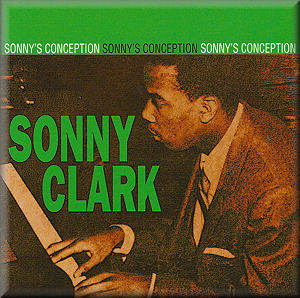CD1
1. Improvisation No.1
2. All God's Chillun Got Rhythm
3. Body and Soul/Jeepers Creepers
4. Improvisation No. 2/Over the Rainbow
5. Move
6. Oslo
7. After You've Gone
8. Once in a While
9. Dial "S" For Sonny
10. Bootin' It
11. It Could Happen to You
12. Sonny's Mood
CD2
1. Shoutin' on a Riff
2. Love Walked In
3. News for Lulu
4. Sonny's Crib
5. Speak Low
6. With a Song in My Heart
7. Come Rain or Come Shine
8. I Didn't Know What Time It Was
9. Two Bass Hit
CD3
1. Bebop
2. Tadd's Delight
3. Softly as in a Morning Sunrise
4. I'll Remember April
5. Cool Struttin'
6. Blue Minor
7. Sippin' at Bells
8. Deep Night
9. Black Velvet
CD4
1. I'm Just a Lucky So and So
2. Gee Baby Ain't I Good to You?
3. Ain't No Use
4. The Breeze and I
5. I Can't Give You Anything but Love
6. Minor Meeting
7. Nica
8. Sonny's Crib
9. Blues Mambo
10. Blues Blue
11. Junka
12. My Conception
13. Sonja
Like several other jazzmen who died at an early age because of drink and drugs, pianist Sonny Clark has become a slightly mythical figure in jazz history. Before his death at the age of 31, he worked for some years as a regular pianist for Blue Note Records, accompanying the likes of John Coltrane, Donald Byrd, Hank Mobley and Kenny Burrell. Bill Evans dedicated his composition NYC's No Lark (an anagram of "Sonny Clark") to Sonny.
Sonny Clark had actually played for many years on the West Coast with the likes of Wardell Gray, Buddy de Franco and Howard Rumsey's Lighthouse All Stars, but he moved to New York in 1957 as accompanist to Dinah Washington. This four-CD box set features Sonny's work from 1954 until 1960.
If you have not heard him before, your view of Sonny may depend on which of these four CDs you hear first. I chose the last CD, entitled Sonny's Blues, from which you might gain the impression that Clark was an adequate but not very enterprising pianist. Perhaps his addictions slowed down his earlier brilliance, as the first CD, Sonny's Mood, reveals a consummate master of the piano, capable of runs which equalled the fleet-fingered talent of Art Tatum.
The first eight tracks were recorded while Sonny was on a European tour with Buddy De Franco. They don't include Buddy but consist of five solo tracks and three trio cuts. The recording quality is poor because the first seven tracks were recorded at a private party, with people chatting in the background.
Sonny was heavily influenced by Bud Powell, as you can hear in his concentration on the right hand. Body and Soul starts with a variety of quotations, illustrating Sonny's mercurial improvising, which segues into Lover Man and then Jeepers Creepers. An ultra-fast version of Move is a bit too speedy even for Sonny but he manages to insert some favourite quotations on the way.
Dial "S" for Sonny marks Clark's move to New York and his first session as a leader for the Blue Note label. This tune and Bootin' It were written by Sonny, typical of many of his compositions on this album: the former a mid-tempo bluesy theme; the latter an up-tempo boppish number.
The second CD begins with Shoutin' on a Riff, a Clark invention that encourages Sonny, tenorist Hank Mobley and trombonist Curtis Fuller to let themselves go at a fast tempo. Love Walked In proves that Sonny could play a ballad with lyricism, although he moves into his preferred mid-tempo fairly quickly. News for Lulu is the first of five 1957 tracks with a sextet that includes John Coltrane, who solos comfortably with hints of his later "sheets of sound".
Paul Chambers was often in the rhythm section for Sonny's recordings and he is part of a trio on the next six tracks, which also include drummer Philly Joe Jones. Two Bass Hit actually features drummer Jones rather than bassist Chambers, swinging like mad. This trio session spills over onto the third CD, which opens with a swift Bebop, where Sonny's fingers again fail to keep up with the tune. He seems more comfortable in Tadd Dameron's Tadd's Delight, perhaps because it is at mid-tempo. I'll Remember April is a delicate performance taken out of tempo.
Cool Struttin' is the title-track from a 1958 LP which the sleeve-note says "many fans regard as Sonny's finest album". Paul Chambers and Philly Joe Jones lay down a solid beat for four tracks which are enlivened by Jackie Mcl.ean's pungent alto sax. Sonny's solos on Deep Night show just how airy he could be.
The first five tracks of the last CD in this collection consist of jazz standards, recorded in 1958, while the last eight are all Clark originals recorded in 1960. As I hinted earlier, Sonny's inventiveness seems to have diminished by the time of these final recordings, all made with a trio. His fingering certainly seems less assured in quick numbers like Blues Mambo.
Hearing these four albums persuades me that Sonny Clark was a good
pianist but hardly a great one. I doubt if he was the master that
many critics claim, although it is good to hear these sides to re-assess
his capabilities.
Tony Augarde
www.augardebooks.co.uk
